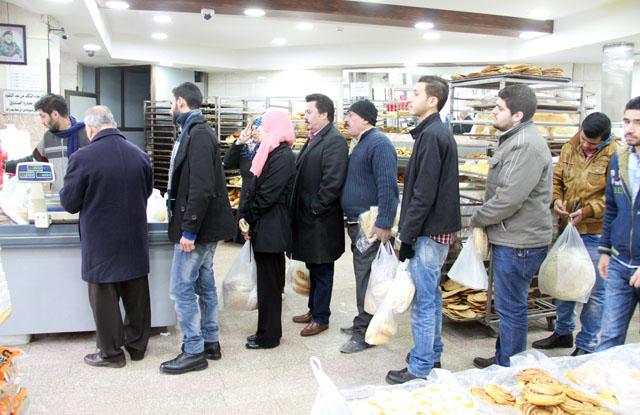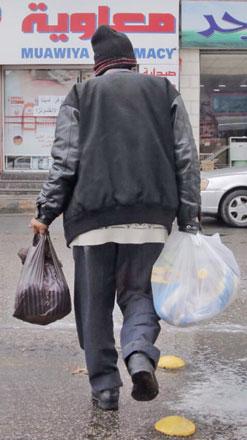You are here
'Consumers buying more fuel, but not overstocking on food'
By Dana Al Emam - Jan 28,2017 - Last updated at Jan 28,2017
AMMAN — While the cold front that started affecting the Kingdom on Thursday has increased demand on fuel, the demand for food items remained within range, sector leaders said Saturday.
Gas Stations Owners Association (GSOA) President Nahar Seidat noted a "remarkable" demand of gas cylinders, rising above daily average at this time of the year of 130,000 cylinders to around 200,000 cylinders on Thursday and around 217,000 on Friday, and hitting a "record" number.
Seidat told The Jordan Times that demand for diesel and kerosene increased by 30 per cent.
"All oil derivatives are available across the country," he said, adding that the Amman distribution station works round the clock, while those in Zarqa and Irbid governorates work until late night hours.
GSOA is coordinating efforts with the Energy Ministry, the three fuel distribution companies and the management of the Jordan Petroleum Refinery Company, said Seidat, and the association has not received complaints from customers about violations.
The current economic conditions and consumers' decreasing purchasing power have forced changes to consumption habits, according to Khalil Haj Tawfiq, president of the Foodstuff Traders Association, who said there was "average" demand for food products during the cold front.
"Citizens have learned over the past couple of years not to overspend on preparing for heavy rain or snow storms, as weather forecast might not always be accurate and roads would remain open," he said.
In addition, Jordanians have to spend their money wisely because they have to make ends meet until the next paycheck, Haj Tawfiq noted.
This weekend witnessed an average demand compared to this time of the month, as many employees have received their salaries, he said, adding that around 80 per cent of families do their grocery shopping at the end of each month.
Meanwhile, Haj Tawfiq reported an average of 25 per cent drop in Jordanians' purchasing power over the past two years, noting that residents of suburbs and villages are more resilient in this sense because they depend on home-produced food.
Abdul Ilah Hamawi, president of the Bakery Owners Association, also noted a "reasonable" demand on bread, as customers secured their needs for two days, compared to the past few years where many people bought large amounts that exceeded their needs.
He said demand for bread and wheat products doubled on Wednesday and Thursday before the cold front kicked in, but the increase on Friday reached 25 per cent.
"People are more aware now that bakeries work in all weather conditions," Hamawi noted, adding that bakeries had been secured with additional amounts of wheat and other supplies like fuel and yeast to meet the expected rise in demand.
Related Articles
Consumers in Jordan spent around JD58 million on food and fuel during the few days before the blizzard, which hit the Kingdom over the weekend, stakeholders said on Monday.
AMMAN — A polar front forecast to bring heavy rain and snow to high altitudes started affecting the Kingdom on Thursday, prompting people to
AMMAN — The Gas Station Owners Association (GSOA) on Saturday said that demand for gas cylinders rose up to 111,500 cylinders, which is 35,6


















